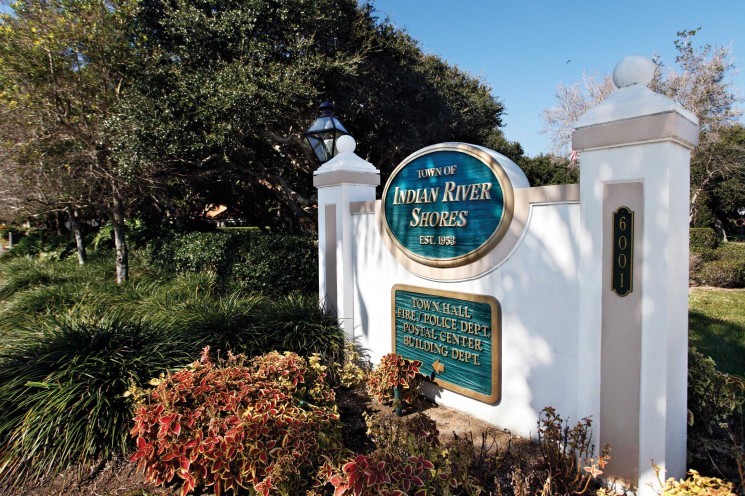
INDIAN RIVER SHORES — When the Indian River Shores Town Council passed up the chance to start paying down a nearly $2.9 million unfunded pension liability this, it seemed like the issue was dead. But the problem and options for fixing it are back on the table.
Council member Dick Haverland started digging into the town’s financials shortly after being elected in March and he found a situation that astounded him.
The town seemed, on paper, to be in the red, and balancing the books could prove costly.
Haverland questioned how the unrestricted net assets of the town could be listed as about $2.7 million – $2.4 million of which is an emergency reserve fund – if the town would owe nearly $2.9 million were it to fully fund the pension program for town employees.
“The town is insolvent, and to me, that’s not acceptable,” Haverland said.
What’s worse, says Haverland, is that the deficit is based upon what he calls “totally unrealistic” projections of returns on the town’s investments.
To achieve the targeted increase in value the fund needs to keep from sinking further behind, the town’s investments would need to earn 8.75 percent gross, or 7.75 percent net of management fees.
The plan, which is managed by the Florida League of Cities, provides a defined benefit for retirees, regardless of the performance of the securities in the plan.
Both the town and the employees contribute, but it is very different from a 401(k) type plan in which the employee bears the investment risk.
Currently, the portfolio is conservatively allocated 60 percent to bonds and 40 percent to stocks.
Haverland had two professional fund managers from Northern Trust and PNC analyze the town’s portfolio and recommend a target to one of the pension committees what the target should be.
The answer came up to about 7 percent gross or 6 percent net.
The rough estimate to fund that kind of adjustment in the trajectory of the plan would require the town to contribute another $350,000 per year to the fund for every year those projections were met – and more during years, such as 2009-10, when the fund lost money or barely broke even.
“And that would just be from the point of the change going forward,” Haverland said. “It wouldn’t do anything to start to address the amount that we’re already in the hole.”
The entire town budget for the 2011-12 fiscal year falls just under $4.7 million. The extra $350,000 would amount to about 7.5 percent of the total budget, based upon current year figures.
The Shores pension plans are currently funded in the neighborhood of 65 percent, according to the most recent numbers Haverland has been able to gather from staff and consultants.
In terms of government pension funds, it’s not rare in this economy to see funds running in the 60 to 70 percent funded range, and the number for “fully funded” is considered to be 85 percent.
To those unaccustomed to government accounting, that might seem odd, but pension funds can go woefully underfunded because the actuary assumes the perpetual nature of the government entity – that unlike a corporation, it will always be there to fund pensions for retirees.
Also unlike a corporation which might dissolve, actuaries also assume that there will always be new government employees coming into the program to help keep it afloat.
During budget workshops, Town Treasurer Judy Lewis advised the council to stick with the pension fund manager’s recommendations.
“We rely on his expertise as to how much to put in and I don’t believe in putting in more than he tells us,” she said.
Minutes of the Sept. 8 Public Safety and Fire Pension Board meeting show that the board voted “to give the Florida League of Cities permission to look into alternative assumption rates (lower) for next fiscal year.”
The motion was made by former Shores Town Councilman Bill Ahrens, who sits on the pension board.
The discussion suggested that the net rate of return be taken down to 7.5 percent from the current net of 7.75 percent.
Haverland said last week that a quarter percent reduction is trivial and doesn’t even amount to a drop in the bucket with regard to solving the problem.
Haverland said he contacted some Shores residents with backgrounds in financial management and urged them to attend the most recent meeting on Nov. 17.
About 20 people attended the meeting and it was moved from the fire station to Council Chambers.
The representative from the Florida League of Cities who provides customer service to the town with regard to the League-managed pension fund was invited, but could not attend, according to Haverland.
“The most recent (minutes) from 11-17 are in process and are not available yet,” said Town Clerk Laura Aldrich via e-mail on Monday, but Haverland reported that there was some lively discussion and input from members of the public regarding the pension fund.
However, no concrete action was taken nor concrete recommendations agreed upon to pass forward to the Town Council.
Shores Public Safety Director Chief Bill Schauman is the pension fund board chairman and Haverland said he can see how Schauman could possibly be conflicted about shaking up the funding of the plan.
Not only would he be potentially affecting his own retirement nest egg, but that of the firefighters, medics and police officers.
“What I’m hearing, what was said at the last meeting, is that if we change the rate of return and it greatly increases the contribution, that it might make us, the Town Council, think about taking away the pension plan,” Haverland said.
The agenda for the Dec. 14 Shores Town Council meeting is not yet available and probably won’t be released until Monday, but Haverland said he will probably want to discuss the pension plan at the upcoming meeting.



